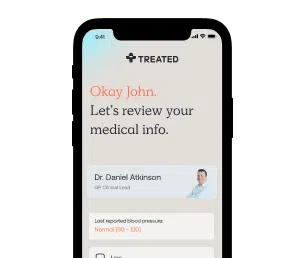Nausea
Tablets to stop you feeling sick.
Secure delivery
UK clinicians
Nausea is an uncomfortable feeling you get before you’re sick. There are lots of reasons why you might get it, and there are medicines that can help to relieve it.
Talk to us to get advice and treatment suggestions from an expert, and order nausea treatment online.
Nausea is the feeling you get when you’re about to be sick (as in vomit). Sometimes it leads to vomiting, but not always. The best way to describe it is as an uncomfortable feeling in your throat and stomach, where you feel an urge to vomit.
It can be caused by a range of things, like migraines, food poisoning, viruses, being pregnant, and some people get it when they travel by boat, car or air (travel or motion sickness). Nausea can also be a side effect of treatment like chemotherapy.
Anyone can get nausea, and most people will get it at least once. Sometimes we know the cause and other times it can happen unexpectedly.
If you have migraines with ‘aura’, nausea can be a symptom. You might get nausea during the first few weeks of being pregnant (this is called morning sickness). Nausea can also happen if you get ‘travel sick’ when in a moving car or boat (this is also called motion sickness).
It’s common to get it occasionally, particularly in situations that can trigger it; for example being on a moving boat, or having a virus or a stomach bug. Because it can be caused by so many different things, and can often be transient, it’s not really possible to estimate how often it happens. (A lot of the time people will get it, it will pass, and they won’t need to tell a doctor about it.)
It’s very common to get morning sickness (which causes nausea and vomiting) during the early stages of pregnancy. Estimates of how common it is vary, from 50% to 70% .
Nausea is more common in people taking certain treatments or with specific medical conditions. For example, if you’re having chemotherapy then you’re more likely to have nausea as a side effect. Some medicines for pain relief like ibuprofen and paracetamol can also cause nausea.

How we source info.
When we present you with stats, data, opinion or a consensus, we’ll tell you where this came from. And we’ll only present data as clinically reliable if it’s come from a reputable source, such as a state or government-funded health body, a peer-reviewed medical journal, or a recognised analytics or data body. Read more in our editorial policy.
The feeling of nausea is caused by a transmission of signals from a sensory part of your body (like the eyes or nose) to the brain. There is a trigger zone in your brain called the chemoreceptor, of the CTZ. This receives and interprets messages sent from the body which are carried by neurotransmitters, which are then passed to the vomiting centre in your brain, which leads to the feeling of sickness.
Generally speaking, nausea is an unpleasant feeling but it's typically harmless. It can result in vomiting, and vomiting a lot can lead to dehydration. So it’s important to replenish your fluids if you’re being sick.
Sometimes the thing that’s causing nausea may be harmful. If you’re getting regular feelings of nausea and you’re unsure what’s causing it then you should seek treatment. There may be an underlying condition that needs attention.

How we source info.
When we present you with stats, data, opinion or a consensus, we’ll tell you where this came from. And we’ll only present data as clinically reliable if it’s come from a reputable source, such as a state or government-funded health body, a peer-reviewed medical journal, or a recognised analytics or data body. Read more in our editorial policy.

How we source info.
When we present you with stats, data, opinion or a consensus, we’ll tell you where this came from. And we’ll only present data as clinically reliable if it’s come from a reputable source, such as a state or government-funded health body, a peer-reviewed medical journal, or a recognised analytics or data body. Read more in our editorial policy.
Have something specific you want to know? Search our info below, or ask our experts a question if you can’t find what you’re looking for.
American Pregnancy Association. (2019). Morning Sickness. [Accessed 2 Nov. 2021].
Morning Sickness with Pregnancy: Causes, Treatment & Prevention.

Tablet available in three different strengths that works in the brain to reduce nausea.

Registered with GMC (No. 4624794)
Meet Daniel
Registered with GPhC (No. 2202465)
Meet Sanjeda
Registered with GPhC (No. 2070724)
Meet Craig
Always read the leaflet that comes with your medication and tell us about any side effects you get.
We know health, but you know you.
Our experts tell you what’s safe, but you decide what’s best.
Answer a few questions and tell us about yourself. Get tailored advice from our clinicians so you can choose better.

Choose your treatment and how often you have it delivered.

We know things change. It’s the nature of life. We’ll check in regularly to make sure your treatment is still right for you.
Pause. Change. Skip. Start again. Any time you like.
Here are some other things we can help with.
Choose from our range of tablets and solutions. Get ongoing care and support from our experts.
Stop smoking treatments that can help you kick the habit forever, and reduce your risk of disease.
Tablets or injections. Tailored weight loss treatments combined with ongoing support from our experts.
We're making healthcare more about you. Sign up to our newsletter for personalised health articles that make a difference.
Disclaimer: The information provided on this page is not a substitute for professional medical advice, diagnosis, or treatment. If you have any questions or concerns about your health, please talk to a doctor.
We couldn't find what you're looking for.
Here's everything we treat. Or, if you're looking for something we don't have yet, you can suggest something.
If there’s a particular treatment or condition you’re looking for, tell us and we’ll look into it for you.
Submit your question here, or tell us if you’ve found an issue on our site.
We’ll get back to you very soon. We aim to respond to all queries in one working day.
You’re signed up to our newsletter. Keep an eye on your inbox for our latest update.
By clicking 'Subscribe now' you're agreeing to our Privacy Policy.
We’ve sent you an email asking you to confirm your email address.